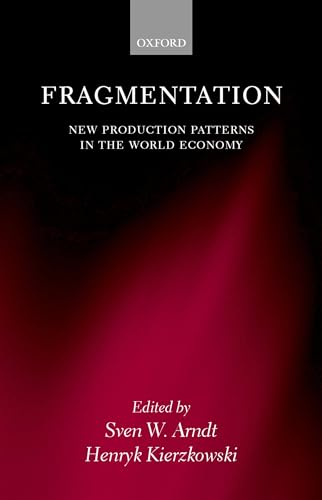Verwandte Artikel zu Fragmentation: New Production Patterns in the World...

Inhaltsangabe
"Fragmentation" is a term used in this volume to describe cross-border component specialization and production-sharing. Examination of recent trade data suggests that offshore sourcing of parts and components, as well as offshore assembly, are assuming an increasing role in the world economy. The theoretical implications of this type of specialization are examined in several chapters with the aid of both Ricardian and Heckscher-Ohlin trade models. Production is first decomposed ("fragmented") into its constituent parts and activities, and then it is at this level that factor-intensities and technologies are calibrated. The implications of intra-product specialization and component trade are investigated under conditions of free, restricted, and preferential trade. The role of multinationals is explored and the importance of cross-border service-links among component activities is examined.
Overall, extension of the principle of comparative advantage beyond products to the realm of parts and components is welfare-enhancing. Industries take advantage of offshore sourcing in order to reduce costs and increase competitiveness. Component specialization offers new and additional opportunities for the exploitation of scale economies. Across a broad range of conditions, it raises output and employment. Its effects on wages are spelled out. Trade between advanced, high-wage and developing low-wage countries is an obvious candidate for the two-way application of component specialization. The empirical part of the volume presents an evaluation of new data which allow the separation of trade in components and in final products. It also provides assessments of the role of component specialization in the trade of several countries and regions.
In addition to their relevance for trade theorists and country specialists, the studies collected in this volume have interesting implications for the conduct of trade policy. They contradict claims that trade with low-wage countries must be welfare-reducing and they suggest new approaches to industrialization and economic development.
Die Inhaltsangabe kann sich auf eine andere Ausgabe dieses Titels beziehen.
Über die Autorin bzw. den Autor
Sven W. Arndt is C.M. Stone Professor of Money, Credit and Trade and Director, The Lowe Institute of Political Economy, Claremont McKenna College; President, The Commons Institute for International Studies. He is also Managing Editor, "North American Journal of Economics and Finance".
Henryk Kierzkowski is Professor of Economics at the Graduate Institute of International Studies in Geneva.
„Über diesen Titel“ kann sich auf eine andere Ausgabe dieses Titels beziehen.
EUR 9,19 für den Versand von Vereinigtes Königreich nach USA
Versandziele, Kosten & DauerNeu kaufen
Diesen Artikel anzeigenEUR 13,76 für den Versand von Vereinigtes Königreich nach USA
Versandziele, Kosten & DauerSuchergebnisse für Fragmentation: New Production Patterns in the World...
Fragmentation : New Production Patterns in the World Economy
Anbieter: Better World Books Ltd, Dunfermline, Vereinigtes Königreich
Zustand: Very Good. Ships from the UK. Former library book; may include library markings. Used book that is in excellent condition. May show signs of wear or have minor defects. Artikel-Nr. 16427702-6
Anzahl: 1 verfügbar
Fragmentation: New Production Patterns in the World Economy
Anbieter: Ria Christie Collections, Uxbridge, Vereinigtes Königreich
Zustand: New. In. Artikel-Nr. ria9780199243310_new
Anzahl: Mehr als 20 verfügbar
Fragmentation : New Production Patterns in the World Economy
Anbieter: AHA-BUCH GmbH, Einbeck, Deutschland
Buch. Zustand: Neu. Neuware - As the world economy becomes more integrated, products become more globalized. Airplanes, automobiles, computers, watches, and garments are among products whose constituent parts are made all over the world. This volume presents arguments and evidence showing that this process is benign: it raises competitiveness, creates jobs, and enhances economic welfare. Artikel-Nr. 9780199243310
Anzahl: 2 verfügbar
